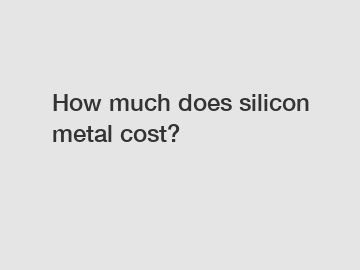How much does silicon metal cost?
How much does silicon metal cost?
Silicon metal is a crucial and widely used material in various industries, including electronics, solar energy, and construction. Its unique properties make it an essential component in many products, from semiconductors to alloys. As the demand for these industries continues to rise, the cost of silicon metal becomes an important consideration for manufacturers, investors, and consumers alike. In this article, we will explore the factors that influence the price of silicon metal and delve into its various applications.
1. Market Supply and Demand.

The primary driver of the cost of silicon metal is the market supply and demand dynamics. As with any commodity, when the demand for silicon metal exceeds the available supply, prices tend to rise. Conversely, when the supply exceeds the demand, prices tend to fall. Factors that influence this balance include the growth of industries that heavily rely on silicon metal and the availability of silicon reserves for extraction and processing.
2. Production Costs.
The cost of producing silicon metal also plays a significant role in determining its market price. The extraction and refining processes involve substantial energy consumption and intricate procedures. Energy prices, labor costs, and technological advancements all impact the production expenses, ultimately affecting the final cost of silicon metal. In addition, the location of production facilities can influence costs, as transportation expenses may vary depending on proximity to silicon reserves or end-user markets.
3. Impurities and Quality.
The purity and quality of silicon metal are vital considerations when assessing its price. High-purity silicon metal, often used in the semiconductor industry, undergoes extensive purification processes and commands a higher price due to its exceptional electrical properties. Conversely, silicon metal with lower purity or containing impurities may be suitable for different applications, such as aluminum alloys. These variations in quality impact production costs and can lead to price fluctuations in the market.
4. Global Economic Factors.
The fluctuations in the global economy can also influence the cost of silicon metal. During periods of economic growth and increased industrial activity, the demand for silicon metal rises, potentially leading to price increases. Conversely, economic downturns can reduce demand, causing prices to decline. The global market's interconnectedness means that economic factors such as trade policies, currency exchange rates, and geopolitical events can all impact the availability and cost of silicon metal.
In conclusion, understanding the factors that influence the cost of silicon metal is crucial for both industry professionals and consumers. Market supply and demand, production costs, quality and purity, and global economic factors all contribute to determining the price of this essential material. As industries, such as electronics and solar energy, continue to expand, the demand for silicon metal is likely to rise, potentially affecting its cost. It is vital for manufacturers, investors, and consumers to stay abreast of these market dynamics to make informed decisions regarding the procurement and pricing of silicon metal.
The company is the world’s best Custom Ceramic Foam Filte, Ceramic Foam Filter for Aluminum Casting, Chrome Aluminum Master Alloy for aluminum casting supplier. We are your one-stop shop for all needs. Our staff are highly-specialized and will help you find the product you need.
166
0
0

Comments
All Comments (0)